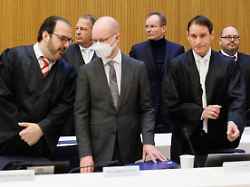Allegations in the fraud process
Key witness calls Wirecard a “cancer”
12/19/2022, 12:25 p.m
Shortly after Wirecard went bankrupt, manager Oliver Bellenhaus presented himself to the Munich authorities and gave a comprehensive statement. In court, he now accuses the former CEO Markus Braun as a key figure in years of fraud involving billions, who acted “absolutistically”.
In the Wirecard trial, the prosecutor’s key witness accused former CEO Markus Braun as a key figure in years of billions in fraud. “Wirecard was a cancerous growth,” said co-defendant manager Oliver Bellenhaus on Monday before the Munich Regional Court. “There was a system of organized fraud.” Braun was an “absolute CEO” (Chief Executive Officer).
“If he said something, that’s how it was done.” Braun and Bellenhaus have been in custody for two and a half years, the third accused is the former Wirecard chief accountant. The public prosecutor accuses the three defendants and other suspects of forming a criminal gang of fraudsters and cheating the lenders of the Dax group, which collapsed in 2020, out of 3.1 billion euros with invented profits. Brown denies the allegations.
“He sees himself as a victim, and that’s a well-known pattern,” Bellenhaus said of his former boss. Until the collapse of the payment service provider in June 2020, Braun had always rejected years of doubt about the balance sheets in bulk. “Blind loyalty” to Braun and the former sales director Jan Marsalek, who has been on the run for two and a half years, made him break the law and put him in prison, Bellenhaus said. On the third day of the trial, the 49-year-old was the first of the three accused to testify; he is also the only one to admit the allegations. “I’m shocked about my own life,” said the key witness – and emphasized how much he regrets the immense damage. However, Bellenhaus’ statement did not reveal when the fraud began and how the Wirecard gang is said to have formed.
Braun’s defense accuses him of having set aside and embezzled millions of dollars in company money. Despite being a key witness, Bellenhaus has been in custody for two and a half years, like Braun. “Big lies became big lies,” Bellenhaus said about the beginnings of the criminal business. However, he reported on several meetings in which Braun and other suspects are said to have taken part and discussed how the facade of the invented business could be preserved. Wirecard was a payment service provider that mainly processed credit card payments in retail and on the Internet. According to the indictment, Wirecard booked billions of euros in invented “third-party” sales via the subsidiary Cardsystems Middle East in Dubai managed by Bellenhaus. These third-party partners were companies that processed payments on behalf of Wirecard.
Proceedings flooded with new documents
The Dax group collapsed in June 2020 after admitting that 1.9 billion third-party funds allegedly booked in Southeast Asian trust accounts could not be found. The public prosecutor’s office accuses the three defendants, Jan Marsalek, the sales director who went into hiding, and other suspects of forming a gang and cheating the group’s lenders out of 3.1 billion euros. Braun has explained through his defense attorneys that the missing billions actually existed, but that immense sums of money had been siphoned off by Bellenhaus and other scammers. For his part, Bellenhaus accused Braun of “misconceptions”. If the third-party business had existed and been profitable, traces of it should have been found even after the Wirecard collapse.
“After June 18, 2020, all of this should have disappeared overnight without a trace,” said Bellenhaus. More than 1000 dealers would have had to look for a new partner for payment processing. “Such a processing vacuum should have caused some unrest throughout the industry.” Braun’s defense attorney Alfred Dierlamm wants the process to be stopped because of serious allegations against the public prosecutor’s office. Dierlamm accuses the investigators of having started investigating the actual payment flows far too late. Those involved in the proceedings would be flooded with new documents, said the lawyer – shortly before the start of the process 44,000 PDF pages, then another 11,000 pages.
“The investigations that the public prosecutor’s office missed in two years of proceedings and are now being carried out parallel to the ongoing main hearing are a bottomless pit,” said the defense attorney. Dierlamm’s second, equally serious allegation is that the public prosecutor’s office withheld essential documents from the defense. The public prosecutor rejected the criticism. “The files on this indictment are complete,” said the investigating authority on request. The billions in the accounts of former Wirecard business partners cited by Braun and Dierlamm relate to transactions that are not part of the indictment and are therefore irrelevant to the proceedings. The Chamber has not yet decided on the suspension request.
